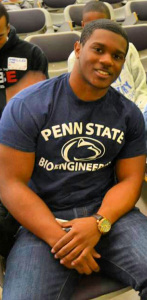Master of His Own Destiny: Biological Engineering Senior Shares Study Abroad Experiences in Spain
by Clay Swackhamer
This semester I am studying at the University of Alicante, Spain, and through my experiences here I have learned a lot more than how to rock a European swimsuit. Of course, I’ve learned a lot from classes, including a difficult class in microbiology (taught entirely in Spanish). This course helped me to iron out some of my microbiology laboratory techniques and go in depth into some areas of microbial metabolism that I think will help me to carry out better research in the lab where I work at Penn State, which is in the field of metabolic pathway engineering.
In addition to the engineering knowledge that I have built while abroad, I have gained a lot of life experiences. Before studying abroad I never would have pictured taking an 80-mile religious pilgrimage on foot, partying at club Space on the island of Ibiza, going to an indie rock concert in a bull ring, getting exercise by jogging up to a castle each day to watch the sun set, or flying to Boston for a week-long synthetic biology convention and then back to Spain.
The knowledge I have gained in class will help me in my engineering career, but, hey, I could have read about bacteria without ever leaving Penn State. The unique things that I got out of studying abroad are a flexibility, maturity, and sense of personal responsibility that came with being the master of my own destiny in an environment that challenged me and forced me to find new ways to solve problems.
My study abroad experience has taken me to Spain, for the most part, but it also led me to three different Mediterranean islands and five different cathedrals, as well as the Boston subway, and helped me become fluent in a second language.
I know for sure that I am a better engineer because of it.
Clay Swackhamer is a senior in biological engineering. The Topton, PA native is involved in many clubs and activities, including the American Society of Agricultural and Biological Engineers, Alpha Gamma Rho, Salis Laboratory for Synthetic Biology and Metabolic Pathway Engineering, and the Tennis Club. Following graduation, Clay will seek an advanced degree.
Read More


Follow Us!